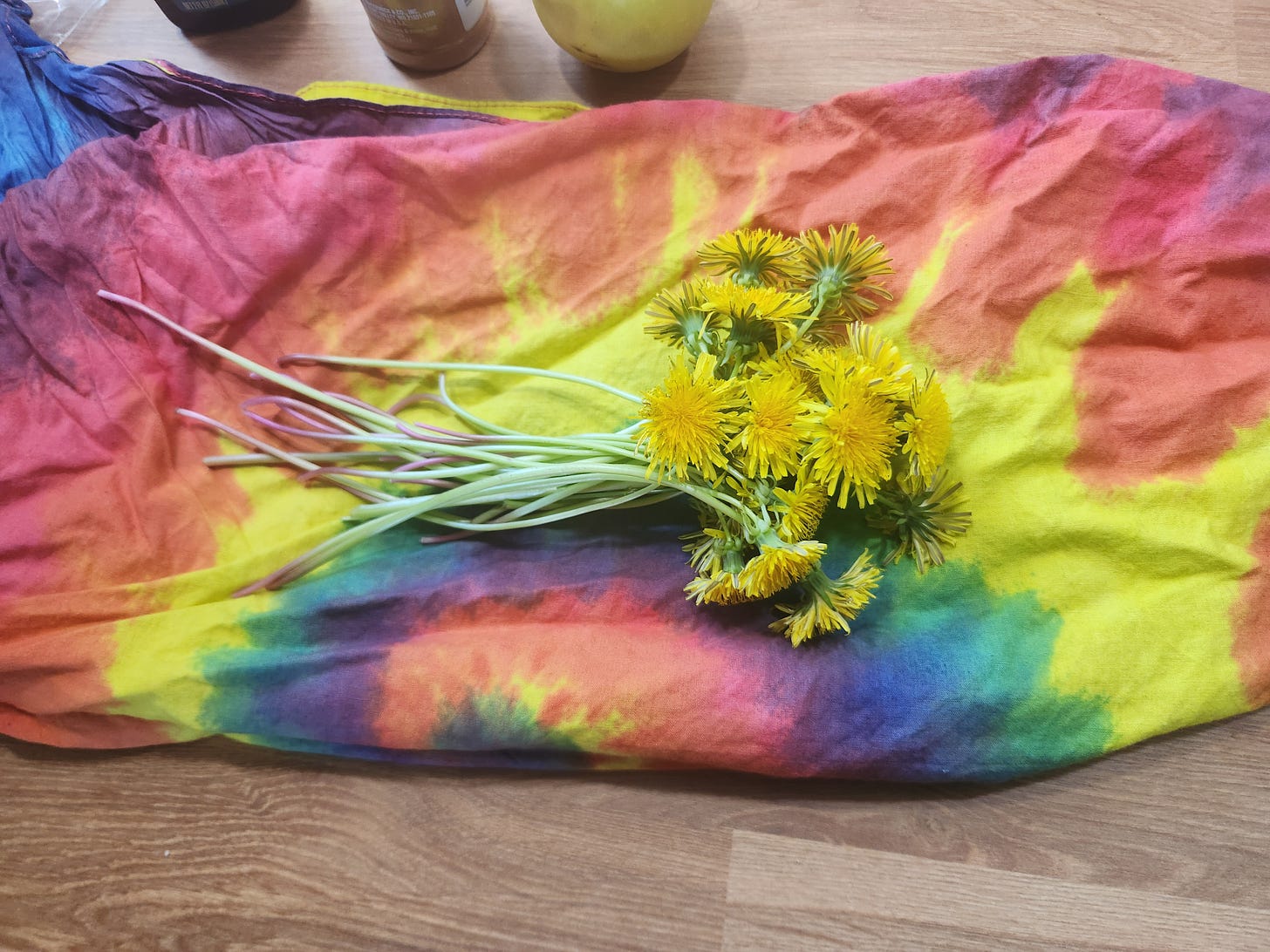Foraging as Spiritual Practice: Or, On the Fluidity of Disability
A simmer pot for disabled, queer resistance . . .
My allergies aren’t fully in remission, but I can forage now without getting a migraine. Still, I live with multiple disabilities, and throughout them all, what I said about moon phases and spoon phases in my book still holds true:
The moon goes in phases, and my symptoms—mental, physical, and everything in between—go in phases. On days when it’s bad, I remember that the brightness of a metaphorical full moon is on the rise. On days when it’s good, I remember the importance of the darkness of periods of rest. On the really bad days, I remember that eclipses don’t last forever . . . in a day, in a week, in a month, or maybe even in a year, things will feel better again. Through it all, the moon is still the beloved moon . . . and I am still the beloved me.
Disability is fluid . . . and just as valid when it is.
Still, in gratitude, I can forage now, and on a recent spring day, I did. Sam and I had some apples that were going bad, and the house needed a refresh, so I prepared a simmer pot of one of the apples, some cinnamon and vanilla, and some dandelions foraged from our yard. Soon, our house smelled like dandelion tea—like summer and cinnamon.
Dandelions have long been my favorite flower, so here’s what I was seeking to imbue in my home and life in a witchy way with this dandelion-centered simmer pot. (Botanical symbolism infodump ahead!)
(This post contains affiliate links. I earn a small commission on Bookshop.org links used to purchase books. All Microcosm titles I recommend here, if purchased, benefit me financially because I am employed as an author and editor for Microcosm. Microcosm books are not included in my Bookshop lists/links for this reason. All that being said, I only recommend books I believe in. I use these recommendations as one small way to make my editing/writing work as sustainable as possible. Thanks for reading!)
Dandelion (Taraxacum officinale)
Jessica Roux’s Floriography suggests “pair[ing] [dandelions] with ferns for a magical solstice celebration” and “foxglove and holly to indicate the ability to solve a future problem” and associates this flower with “wishes and fortune-telling,” due to the tradition of blowing the fluffy white seeds of this striking plant.
Maggie Herskovits’s An Urban Field Guide to the Plants, Trees, and Herbs in Your Path (a book I edited for Microcosm) notes that “the species name, officinale, is Latin for ‘medicinal or culinary use,’ ” noting the many gifts this stigmatized and plentiful flower offers.
Juliet Diaz’s Plant Witchery discusses this plant’s associations with resilience.
So, taken together, in our queer home, I was declaring wishes of plentiful, resilient, and safe queer folx, despite the obstacles we face (especially with so many trauma-related disabilities existing in our communities), thriving as our unique selves in our world—no matter how fluid our abilities may or may not be.
And those intentions in the context of community? I consider them to be spiritual,1 divine,2 and magickal.3
Let me know in the comments. What would you have put in a simmer pot for disabled, queer resistance?
In Wonder,
Ivy Zeller (she/they)
Thanks for reading! I’m a queer, disabled writer/editor, and what I do is made possible by readers like you. You can support me in this journey in a number of ways:
When I describe or experience any tool/practices as spiritual, I want to acknowledge that that is not everyone’s experience. Any practice/tool I share is meant for all, regardless of spiritual label (or lack of label) or whether you experience these tools as spiritual or as some other adjective(s). Labels, while helpful in describing our experiences, are ultimately insufficient, so I want to hold space for that tension here.
My understanding of how god expresses godself is expansive. Basically, I conceive of spirituality as our experience with divine love and connection. But even that feels a little religious-y. Put another way, I believe spirituality is the place where we as individuals and communities connect with the “force of love that holds up the universe” (in words sometimes attributed to Julian of Norwich), whether we conceive of that love as divine or as the love shared between fellow humans/other creatures or some combination of both loves. It is the place within our bodies and our communities where we find love and connection with all who have come before and who will come after.
I consider witchcraft to be “spicy placebo,” and my practice is very secular. I love the definition of magick laid out in this article: “action taken to bring about internal transformation or external change.”






I love dandelions too and I’m adding An Urban Field Guide to my wish list.